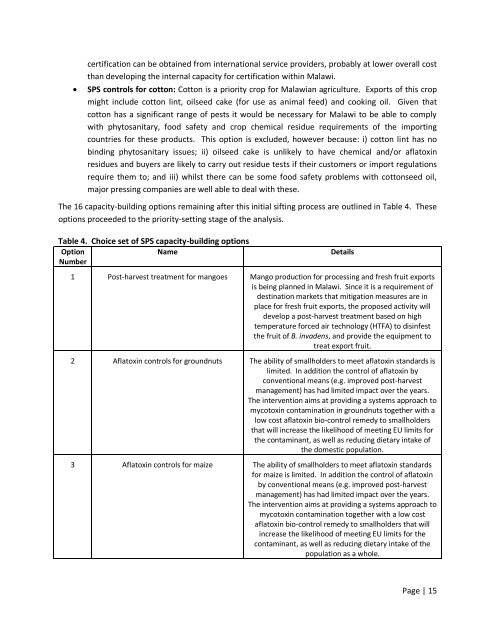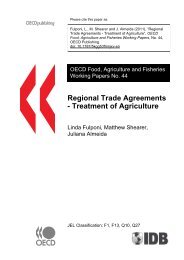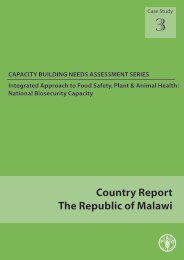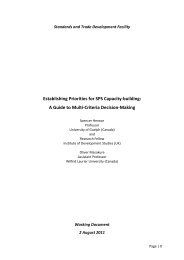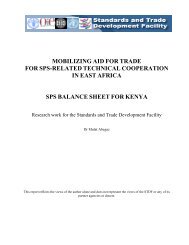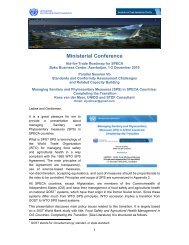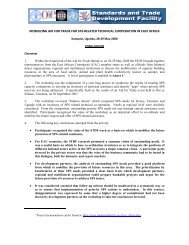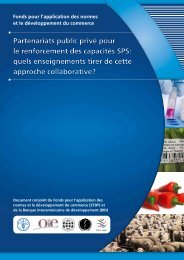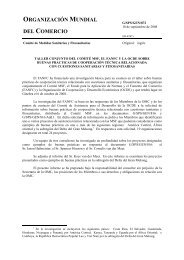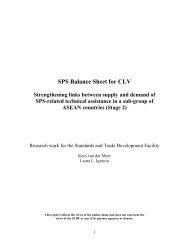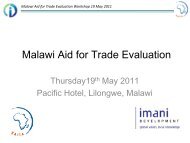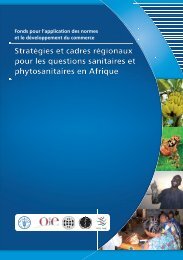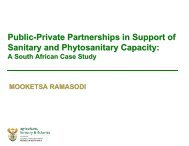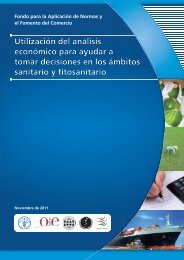MCDA Final Report Malawi - Standards and Trade Development ...
MCDA Final Report Malawi - Standards and Trade Development ...
MCDA Final Report Malawi - Standards and Trade Development ...
You also want an ePaper? Increase the reach of your titles
YUMPU automatically turns print PDFs into web optimized ePapers that Google loves.
certification can be obtained from international service providers, probably at lower overall cost<br />
than developing the internal capacity for certification within <strong>Malawi</strong>.<br />
SPS controls for cotton: Cotton is a priority crop for <strong>Malawi</strong>an agriculture. Exports of this crop<br />
might include cotton lint, oilseed cake (for use as animal feed) <strong>and</strong> cooking oil. Given that<br />
cotton has a significant range of pests it would be necessary for <strong>Malawi</strong> to be able to comply<br />
with phytosanitary, food safety <strong>and</strong> crop chemical residue requirements of the importing<br />
countries for these products. This option is excluded, however because: i) cotton lint has no<br />
binding phytosanitary issues; ii) oilseed cake is unlikely to have chemical <strong>and</strong>/or aflatoxin<br />
residues <strong>and</strong> buyers are likely to carry out residue tests if their customers or import regulations<br />
require them to; <strong>and</strong> iii) whilst there can be some food safety problems with cottonseed oil,<br />
major pressing companies are well able to deal with these.<br />
The 16 capacity-building options remaining after this initial sifting process are outlined in Table 4. These<br />
options proceeded to the priority-setting stage of the analysis.<br />
Table 4. Choice set of SPS capacity-building options<br />
Option<br />
Name<br />
Number<br />
Details<br />
1 Post-harvest treatment for mangoes Mango production for processing <strong>and</strong> fresh fruit exports<br />
is being planned in <strong>Malawi</strong>. Since it is a requirement of<br />
destination markets that mitigation measures are in<br />
place for fresh fruit exports, the proposed activity will<br />
develop a post-harvest treatment based on high<br />
temperature forced air technology (HTFA) to disinfest<br />
the fruit of B. invadens, <strong>and</strong> provide the equipment to<br />
treat export fruit.<br />
2 Aflatoxin controls for groundnuts The ability of smallholders to meet aflatoxin st<strong>and</strong>ards is<br />
limited. In addition the control of aflatoxin by<br />
conventional means (e.g. improved post-harvest<br />
management) has had limited impact over the years.<br />
The intervention aims at providing a systems approach to<br />
mycotoxin contamination in groundnuts together with a<br />
low cost aflatoxin bio-control remedy to smallholders<br />
that will increase the likelihood of meeting EU limits for<br />
the contaminant, as well as reducing dietary intake of<br />
the domestic population.<br />
3 Aflatoxin controls for maize The ability of smallholders to meet aflatoxin st<strong>and</strong>ards<br />
for maize is limited. In addition the control of aflatoxin<br />
by conventional means (e.g. improved post-harvest<br />
management) has had limited impact over the years.<br />
The intervention aims at providing a systems approach to<br />
mycotoxin contamination together with a low cost<br />
aflatoxin bio-control remedy to smallholders that will<br />
increase the likelihood of meeting EU limits for the<br />
contaminant, as well as reducing dietary intake of the<br />
population as a whole.<br />
Page | 15


